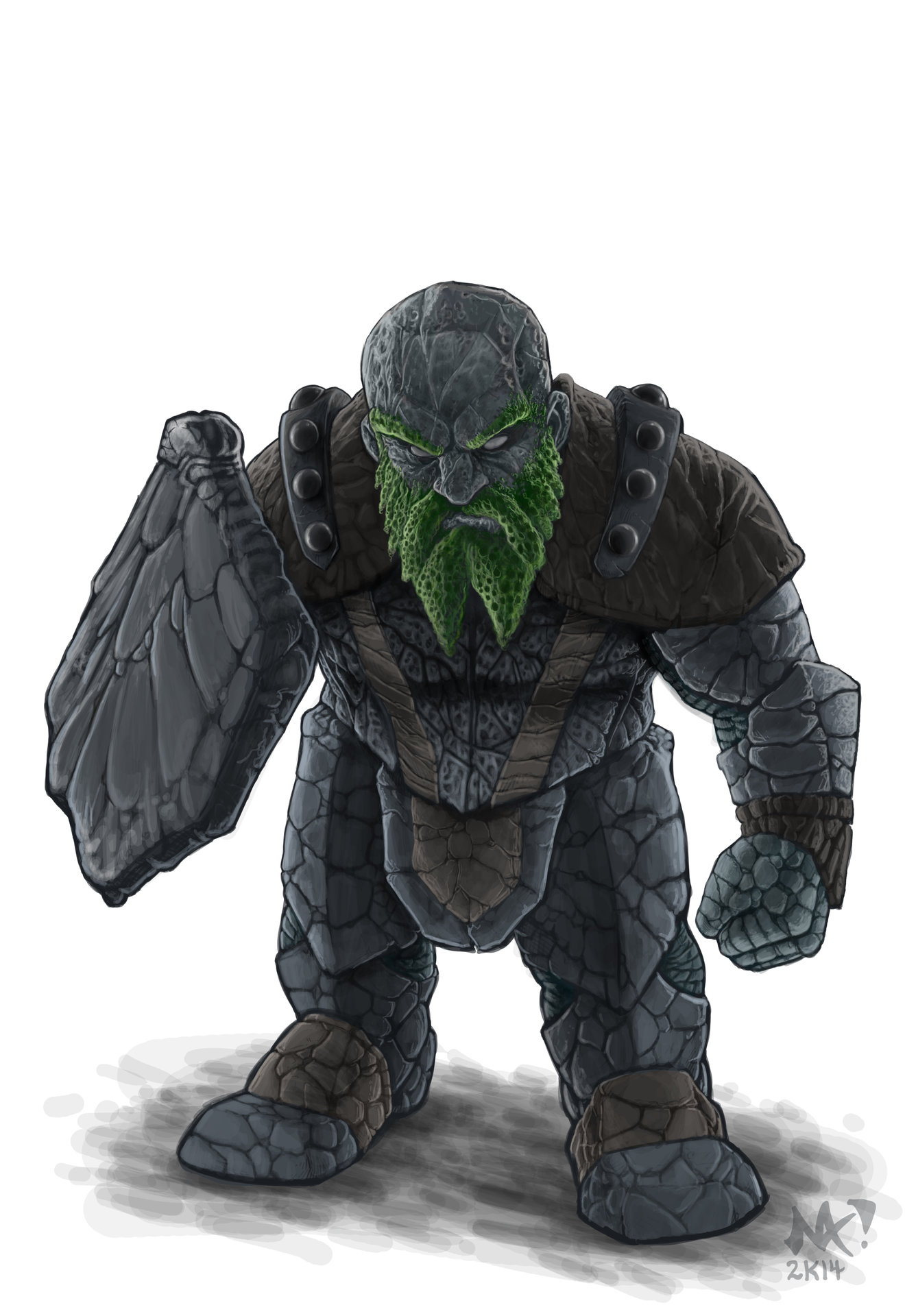
Mole Dwarves
A sub-species of Dwarves born deep in the rock of the world. Weak to the light, strong in the dark, Mole Dwarves are seen as reclusive miners and brawlers.
Overview
Language
Their main language is much like that of their Dwarven brethren. They sound slightly more grating and deeper, and can sound more apprehensive and aggressive.
Appearance
Unrali, otherwise known as Mole Dwarves due to their livelihood are told to be one with the mountain itself. Their skin is that of rock-like nature, hard and cracked with some growing moss over their skin in more damp climates. They have a stocky bulk build like most dwarves, yet are slower and slightly heavier due to their skin. Hair does not grow from their skin. They tend to use moss or weave wigs for their heads to make beards and hair.
In the dark, their eyes tend to glow a dark green, as a fluorescent adaptation to their eyes allows them to have light for their vision in the dark. However, in day light or any other light sources, these see through eye lids do what they can to shield from light. Day light without shade can be quite blinding to unprotected eyes. Eye color range is about the same of most other races, however their eye color look more dull and grey around the edges.
Habitat
Similar to the more common Dwarven brethren of Mole Dwarves, they are more commonly found within underground fortresses. Though they tend to live deeper, and lurk in these more than their brethren. Their fortresses are more crudely cut, resembling closer to caves than clean cut castles. Some of these are damp and humid, which they tend to favor.
Not many Mole Dwarves would be found living in the open, and if they do, they tend to have some fashion of headgear to help protect their sight from sunlight.
Traits
Mole Dwarves share many traits with that of other Dwarves; Combative nature, fine crafts and less magically inclined. They however tend to be less finely tuned in crafts than most dwarves are, taking a certain liking to mining the minerals and materials used in crafting.
Their crafting is seen as more crude by their relative races. Where dwarves may build fortresses with finely cut stone and finely polished metal. But Mole Dwarves have their stone somewhat edged, with some touch of jagged cuts and cracked. Stalactites adorn their ceilings, sometimes decorated for holidays. Their metal has scratches and dents from their rougher craftsmanship.
Their combat ability stands to be more upon a defensive side. Choosing shields over swords, camouflage to ambush. While still aggressive in nature Mole Dwarves depend more on defensive tactics.
History
Background
Mole Dwarves were seen in more ancient times by other races as some lesser Golem-like creature that dwells deep within the earth. They kept themselves hidden from the light, surviving in the dark on what creatures also lived below or whatever fell into chasms and caves that they made their homes. This was their life, and those who trespassed never were seen again.
Later into the worlds life the Mole Dwarves were beginning to reveal themselves to the surface dwellers. Here and there were they sighted, some with jewels in their rock-like skin. Some sitting still to look similar to boulders around. As the days progressed in the world, more and more came. They became recognized as a subrace of Dwarves, lost in the deep that were forced to adapt to survive.
Unrali did not show up in conflicts as much as their brethren, those that did were guards or carried mighty shields into battle. Some became brawlers. Some became smiths of crude yet quickly fashioned weapons and armor. Compared to their Dwarven brethren, Mole Dwarves were seen as more reclusive, valuing their time in the dark rather than out in the light.
Later into the worlds life the Mole Dwarves were beginning to reveal themselves to the surface dwellers. Here and there were they sighted, some with jewels in their rock-like skin. Some sitting still to look similar to boulders around. As the days progressed in the world, more and more came. They became recognized as a subrace of Dwarves, lost in the deep that were forced to adapt to survive.
Unrali did not show up in conflicts as much as their brethren, those that did were guards or carried mighty shields into battle. Some became brawlers. Some became smiths of crude yet quickly fashioned weapons and armor. Compared to their Dwarven brethren, Mole Dwarves were seen as more reclusive, valuing their time in the dark rather than out in the light.
